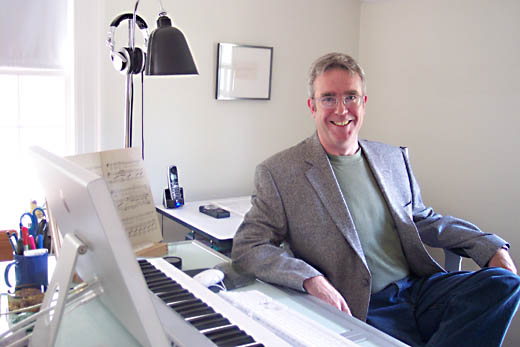Interview with composer Tom Myron

The job requirements of a working composer are elusive, perhaps especially for composition students enrolled in University degree programs that fail to provide graduates with the interpersonal and business skills necessary for survival outside the walls of academia. One student composer told me recently: “We are all being trained to teach.”Woody Allen famously said: “Those who can’t do, teach. Those who can’t teach, teach gym.” But those who compose and don’t teach do find ways to sustain themselves and their passion for music through a variety of collaborative and creative means, some perhaps less “traditional” than others. With this in mind, let’s have a chat with my friend composer Tom Myron.
The range of Tom Myron’s work as a composer includes commissions and performances by the Kennedy Center, the United States Holocaust Memorial Museum, the Portland Symphony Orchestra, the Eclipse Chamber Orchestra, the Atlantic Classical Orchestra, the Eastern Connecticut Symphony Orchestra, the Topeka Symphony, the Yale Symphony Orchestra, the Civic Orchestra of Chicago, the Bangor Symphony and the Lamont Symphony at Denver University. He works regularly as an arranger for the New York Pops at Carnegie Hall, writing for singers Rosanne Cash, Kelli O’Hara, Maxi Priest and Phil Stacey, the Young People’s Chorus of New York City, and the Quebec folk ensemble Le Vent du Nord. Le Vent du Nord’s new CD Symphonique featuring Myron’s orchestra arrangements is receiving an incredible amount of positive press throughout Canada and will be available for purchase in the U.S. soon. A video preview of the recording is included in this interview.
His film scores include Wilderness & Spirit; A Mountain Called Katahdin and the upcoming Henry David Thoreau; Surveyor of the Soul, both from Films by Huey. Individual soloists and chamber ensembles that regularly perform Myron’s work include violinists Peter Sheppard-Skaerved, Elisabeth Adkins and Kara Eubanks, violist Tsuna Sakamoto, cellist David Darling, the Portland String Quartet, the DaPonte String Quartet and the Potomac String Quartet.
Myron’s current projects include commissioned work for the Eclipse Chamber Orchestra and creating arrangements for Joe Jackson’s music-theater piece Stoker
inspired by the life of Bram Stoker author of 1897 Gothic novel Dracula.
Tom (I’ll call him Tom now) graciously took time out of his schedule to answer a handful of questions including several having to do with the “business” of making music.
Chris Becker: You arrange and orchestrate music for a variety of artists and have a career composing concertos, string quartets, and various settings for voice. Are these two separate careers that you have to juggle? Or do they intersect providing you with even more musical opportunities than if you were focused only one or the other?
Tom Myron: From a purely logistical point of view it’s a juggling act. Both types of work tend to lead to more opportunities within their respective areas, but there isn’t a lot of overlap. That said, they DO intersect for me on a more personal, creative level. I love getting to know all kinds of musical idioms in a very practical, mechanical way. I also love just about everything that goes into handling, preparing and rehearsing music for live performance. My training in composition and the orchestral repertoire has benefited my commercial work by giving me the flexibility to consider (and rapidly execute!) multiple solutions to specific problems. The commercial work in turn informs my composition by instilling a disciplined work ethic and keeping organization and clarity of intention foremost in my mind.
Read the rest of this interview.